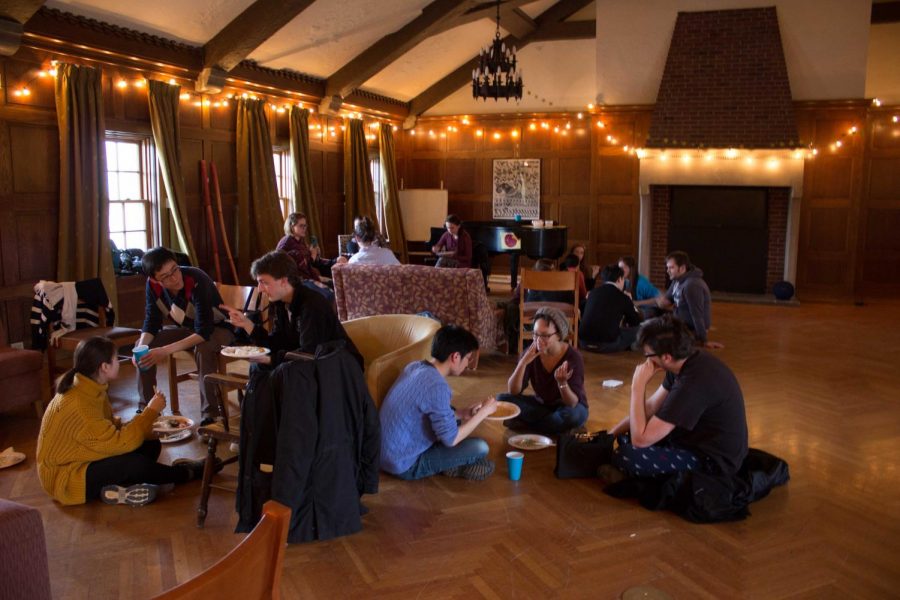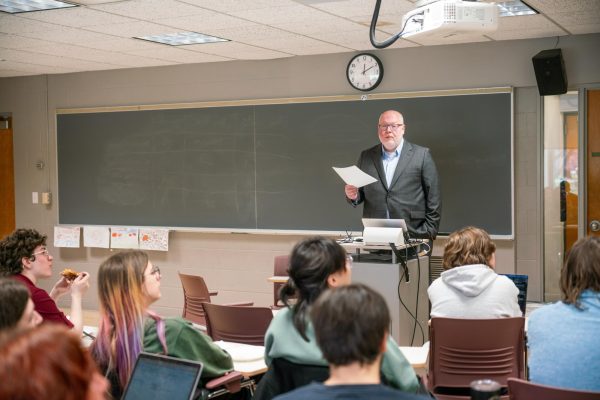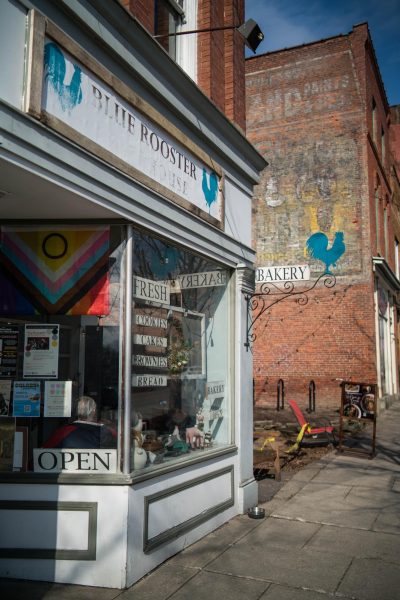POC Student Groups Host Culture-Rich Banquets
Students enjoy food and conversation at the OKSA banquet.
Editor’s Note: The OKSA Banquet was covered by Yuxin Wang, ASA by Birsa Chatterjee and Jude Fernandes, and SASA by Victoria Albacete.
Diverse cultures shared the spotlight last weekend as the Oberlin Korean Student Association, African Students Association, and South Asian Students Association all held banquets, either simultaneously or in succession.
OKSA organized a banquet called “A Night Out in Seoul” in Asia House’s Shipherd Lounge on Saturday. Featuring a variety of traditional Korean foods and games, the banquet was well-received by students and faculty who attended. As an essential part of the Asian student population on Oberlin’s campus, OKSA is known for hosting activities such as K-pop radio with WOBC, as well as K-pop nights at the ’Sco.
Saturday’s street food banquet was a continuation of the high-quality events that OKSA presents in celebration of Asian culture and in contribution to cultural diversity in Oberlin. The event drew the attention of many non-Korean students and served as a way to learn about Korean food and culture. Dishes included kimbap — or Korean sushi rolls — and the lounge was decorated with lights to simulate the look of a real “night street” in Seoul. Many students outside of OKSA volunteered to help, and the hard work resulted in the great experience one might expect.
“There’s not any good Asian food available at Oberlin normally, and I used to have a lot of Korean food at home,” said College sophomore Shana Li. “Banquets are important because they give students a specific culture space to express themselves and enjoy their culture with other people.”
This connection to street food inspired the banquet’s theme. Hoping to host an informal and cozy yet exciting evening, OKSA put together a virtual night out in Seoul filled with everything its members love about Seoul beside it’s famous street foods — movies, K-dramas, cup noodles, and music — spread across the second floor of Asia House.
“I think that street food is something inseparable from our lives in Seoul,” said College junior and OKSA Chair Soomin Kim. “It might not be as fancy as what we would have in restaurants, but they are as special, if not more, to me and everyone in Seoul. When I walk down the streets of Seoul, I see all kinds of street food just laid out in front of me, and they all bring me back to some of my most heartwarming memories — how I used to hold a cup of hot and steamy fish cake soup in my hands and sip it to warm myself in a cold snowy winter night, and how I used to share a hotteok with my mom on the way back home from downtown. Street foods are something that we all have very personal memories about and just something that is essential to our daily lives in Seoul.”
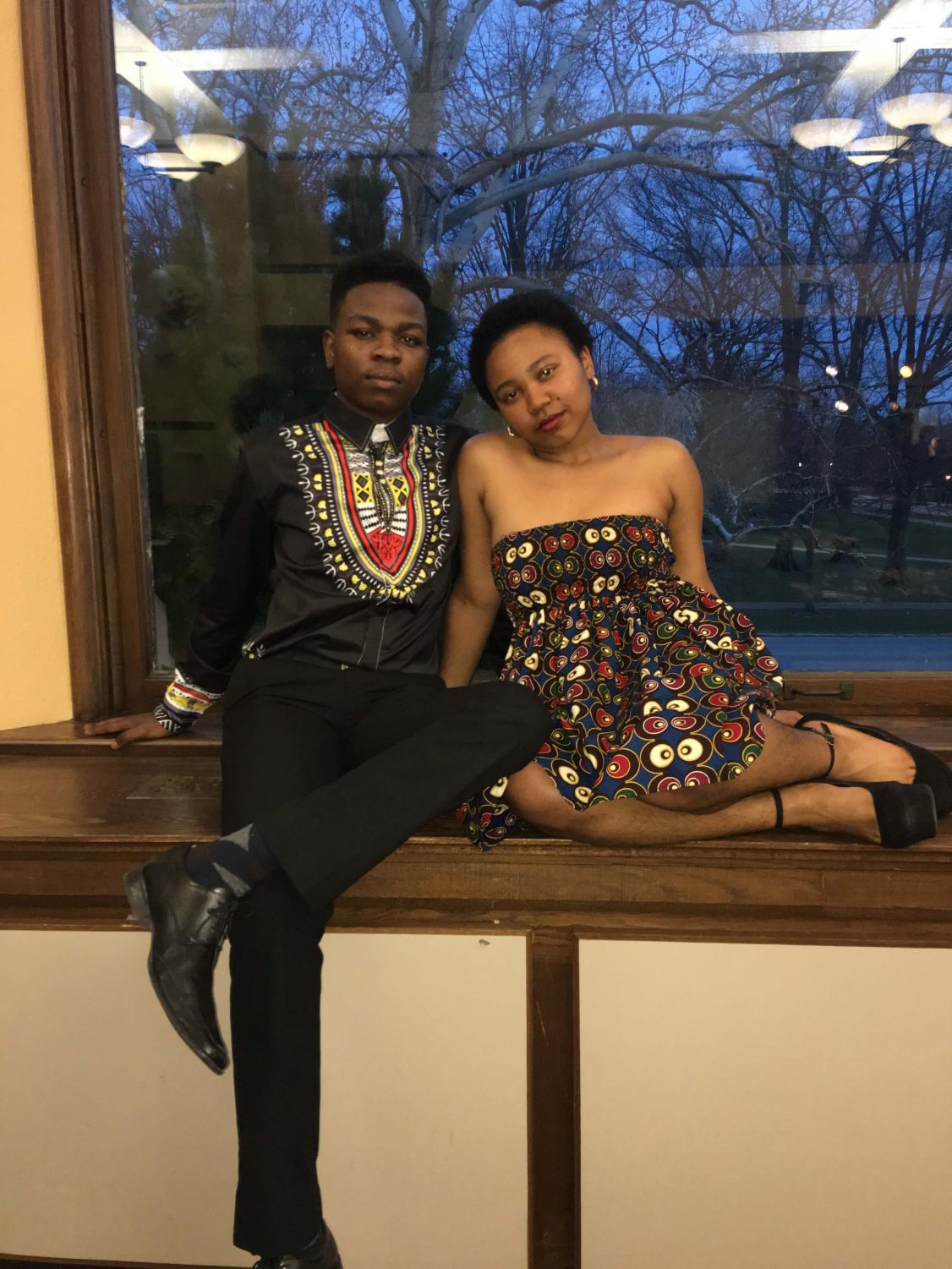
Simultaneously, the African Student Association held its annual banquet in the Carnegie Building Root Room and fundraised for the Yakubu Saaka Fund. The fund was established in honor of longtime Oberlin professor Yakubu Saaka, architect of the Africana Studies Department, to provide financial aid to African students.
ASA titled its event “Revival Banquet.” College senior Thobeka Mnisi said that the banquet signified the revival of the dreams of African students at Oberlin, as well as the dream of people like Yakubu Saaka, who “carved the space for African students on this campus and have paved the way for [African students] to be here.”
Mnisi asked of the guests, “Why are you here today?” She noted that many people may not have heard much about Saaka, and that although the great food being served was a good enough reason to show up, she stressed that African students were also there to celebrate Black achievements.
“I want to invite you into the reason why we are here, and we as in the African Students Association,” Mnisi said. “We — as in African people, who can gather together to celebrate our achievements, to celebrate our dreams, to celebrate our lives — we are here because people like Professor Yakubu Saaka saw a need and began advocating for that change.”
Mnisi acknowledged the significance of the Africana Studies department to all African students.
“The Africana Studies department is the reason why a lot of the Black faces that you see around you are here, even if you’re not majors or minors in the Africana Studies department like me,” she said. “The professors in that department keep us here — they keep us whole. They nurture us. They make us who we are.”
The banquet featured several student performers who incorporated elements from different areas of Black art. One of the performers blended hip hop with jazz, spitting several bars over a beat and then effortlessly switching to the tenor saxophone and played a hook along with a heartfelt solo. Seeing the fusion of two very notable art forms and watching them perform at such a high level was exhilarating. There were also several talented singers who gave phenomenal performances of covers and original pieces. Visiting Assistant Professor of Africana Studies and Dance Talise Campbell’s Djapo group gave a jaw-dropping performance for a second time this semester — the other being at the Sankofa Remix’d: “Reclaiming My Fly” fashion show during Black History Month — of African dance and drumming. There was not a single person in the audience who did not feel the beat.
Mnisi’s stated purpose of celebration was achieved through the wonderful performances that followed her speech.
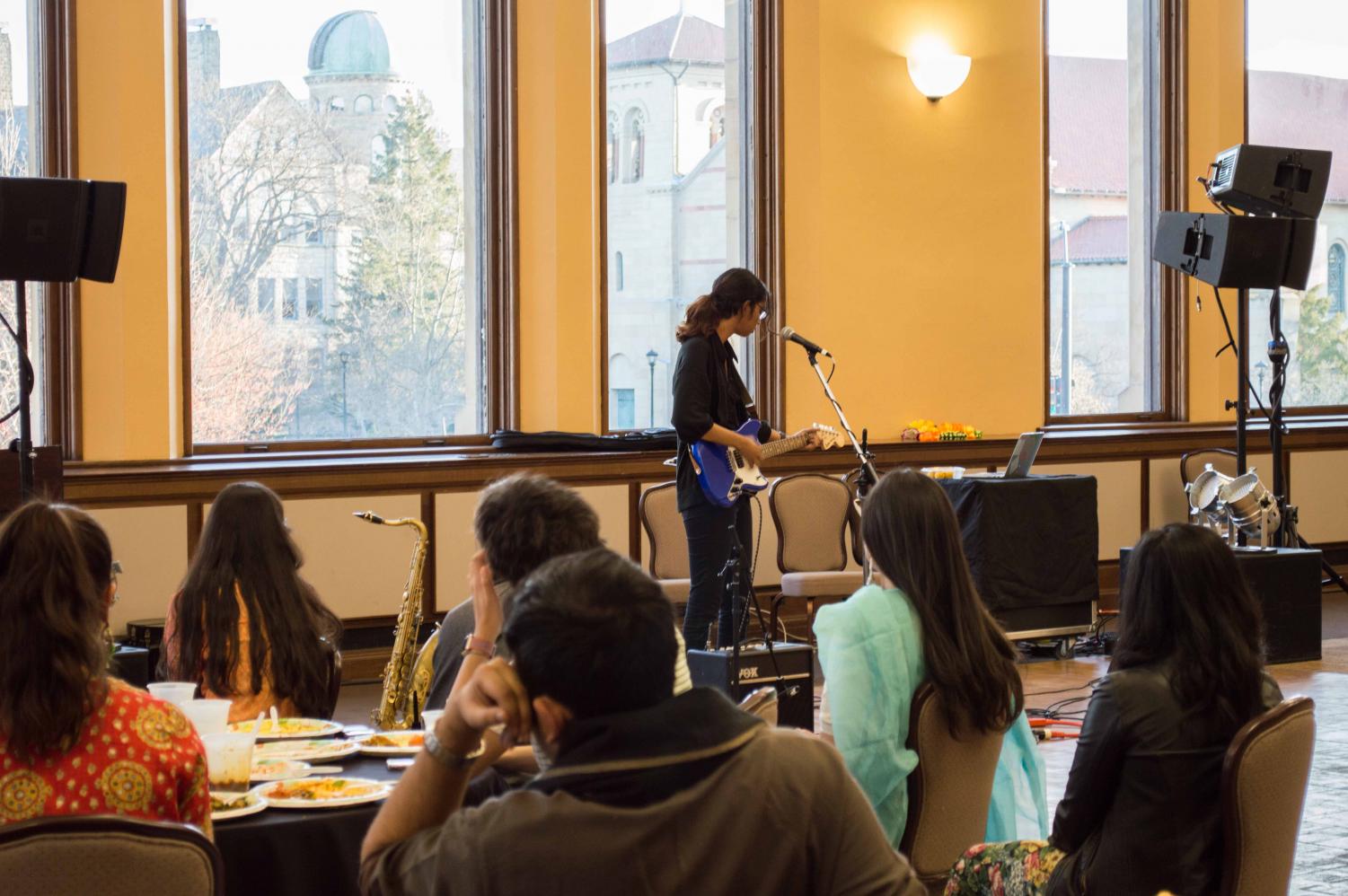
The South Asian Students Association closed out the weekend of banquets by hosting their annual dinner last Sunday, also in the Root Room. Filling the space with delicious food, an appreciative audience, and standout performances, this was not a banquet to miss.
College junior Priyanka Sen and seniors Deborah Johnson and Hassan Bin Fahim recited poems, each vastly different in content, style, and language. Sen performed in Bengali and translated to English, and Johnson presented an original, poignant, Tamil-English poem about heritage and loss. Bin Fahim spoke another original poem in Urdu and translated into English, to much acclaim.
A musical group that included College sophomore Jude Fernandes on the tabla, double-degree senior Mohit Dubey on guitar and vocals, and Conservatory junior Birsa Chatterjee on saxophone composed the second performance of the evening. Playing a medley loosely based on Hindustani classical ragas and Bollywood melodies, the trio entranced the audience with their beautifully haunting music. The piece set up some playful back and forth between the guitar and saxophone, both played with incredible skill, and the tabla provided consistently rhythmic tone changes.
Later in the evening, Fernandes and College sophomore Ananya Gupta played and sang a song from the Indian comedy-drama film 3 Idiots. The Hindi-English song, featuring the duo’s enthusiastic vocals, provoked smiles and singing along from SASA members in the audience, many of them wearing colorful and gorgeous diverse traditional dresses.
The final performance of the banquet came from College first-year Keerthi Sridharan, who stunned with deep, soulful vocals on an original piece as well as several covers, including a song from artist Japanese Breakfast. Sridharan has previously been featured on WOBC’s Live from Studio B under the pseudonym copper king.
“I think [the banquet] is important because it’s a way for us South Asians to celebrate ourselves — the performance aspect is particularly significant to me in that regard, that we get to have our members show off a little just to show off,” College sophomore Indrani Kharbanda, who joined SASA during her first semester at Oberlin, wrote in an email to the Review.
College senior Samir Husain, who has also been an active member of SASA since his first semester at Oberlin, agreed.
“For me, the banquet that we have every year is about celebrating our culture, celebrating the end of the year, and doing so in a way that is traditional to South Asia — that emphasizes our culture, our music, our food,” Husain said. “Being able to share that culture with the rest of Oberlin is really important to us. … It’s also a way for us to make our presence known on campus, since we’re such a small community relative to other schools and universities.”


